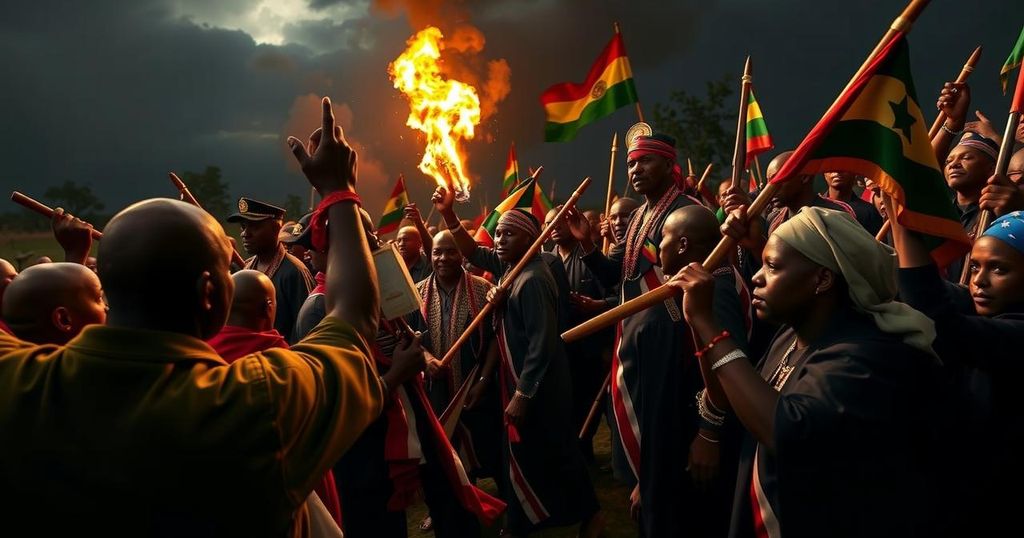South Sudan has postponed its elections to December 2026, marking its fourth extension due to lack of preparation. Dominated by President Salva Kiir and Vice-President Riek Machar, the transitional government prioritizes power retention over electoral democracy. The global community expresses discontent with the lack of progress while significant obstacles remain, including economic challenges and failures in peace initiatives. Meeting the new deadline appears increasingly improbable without effective compromises and political will from current leaders.
The political landscape in South Sudan indicates that the prospects for democracy remain bleak, as the scheduled elections have now been postponed a fourth time to December 2026. This decision primarily reflects the inability of the transitional government, with President Salva Kiir and Vice-President Riek Machar at the forefront, to initiate necessary electoral preparations. Both leaders appear to prioritize maintaining their unearned power over working toward an electoral process that could result in their displacement due to popular vote.
Major General Charles Tai Gituai, the Chairperson of the Reconstituted Joint Monitoring and Evaluation Commission, acknowledged the numerous hurdles hindering the peace agreement’s execution, citing issues such as insufficient political will and a lack of funding. Despite calls for action, there appears to be reluctance among South Sudan’s leaders to mobilize the resources needed to fulfill their obligations under the agreement. The Special Representative of the UN Secretary-General, Nicholas Haysom, expressed disappointment over the postponement, emphasizing that the revitalized peace agreement has taken a back seat to the leaders’ political games.
The troika of supporting countries—the United States, United Kingdom, and Norway—issued statements expressing their disappointment regarding the leaders’ apparent lack of political will, which continues to inhibit the welfare of South Sudan’s citizens. In contrast, the African Union Commission merely noted the postponement and urged adherence to the peace agreement.
Recent initiatives aimed at peace, such as the Tumaini Peace Initiative, have stalled, exacerbating the lack of cooperation among varied factions. With Machar stepping back from the initiative due to perceived threats to his political influence, efforts to unite the various parties have faced additional challenges. According to Haysom, significant compromises are essential for meeting the new election deadline if the government hopes to maintain any semblance of legitimacy.
Haysom also provided a list of crucial actions required to pave the way for elections, which included deploying unified forces, civic education, voter registration preparations, and adjustments to security mandates. However, doubts remain regarding whether these measures will be implemented, given the entrenched mindset of the current leaders.
The absence of political consensus raises questions about the viability of holding elections by December 2026. Dr. Riang Yer Zuor, Chairperson of the National Constitution Review Commission, indicated that crafting a new constitution could take a minimum of 18 months, and with inadequate resources, this may not even be feasible. Parallelly, oil revenue issues, exacerbated by the conflict in Sudan, further compound the challenges facing South Sudan’s economic stability and political process.
There are calls for an impartial caretaker government to oversee the electoral process. Nevertheless, such a proposal would necessitate the cooperation of current political figures, which remains uncertain given the prevailing power struggles and conflicts. As the situation stands, while there might be an absence of outright civil war, South Sudan’s peace remains tenuous and fragile, with ongoing uncertainties about the future.
South Sudan has been grappling with political instability since gaining independence, with multiple attempts at establishing a functional government resulting in repeated electoral postponements. The transitional government, formed following a peace agreement in 2018, has failed to prepare adequately for scheduled elections. Key leaders, Salva Kiir and Riek Machar, prioritize their hold on power over democratic processes. Global support from countries like the United States, United Kingdom, and Norway is crucial, yet the lack of genuine political will among South Sudanese leaders continues to pose substantial risks to progress toward peace and governance. This unstable environment is further complicated by external factors such as the conflict in Sudan, affecting revenue and resources necessary for electoral preparation.
The ongoing political maneuvering in South Sudan underscores a troubling commitment to power preservation among its leaders, as seen in the decision to postpone elections until December 2026. With crucial preparations lagging and underlying economic issues further complicating the path to democracy, the likelihood of a successful electoral process appears grim. Without significant shifts in political will and actionable strategies from the transitional government, South Sudan risks remaining ensnared in its cycle of unrest and governance challenges, impeding the realization of a stable and democratic state.
Original Source: www.eurasiareview.com






